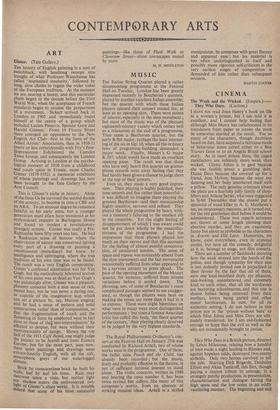MUSIC THE Italian String Quartet played a rather disappointing programme
at the Festival Hall on Tuesday. London has been greatly impressed recently by Boccherini's quintets, played by another excellent Italian ensemble; but the quartet with which these Italian players opened their concert missed fire, at least as an opening shot. There were points of interest, especially in the slow movement ; but most of the music was of the pleasant eighteenth-century variety which comes well as a relaxation at the end of a programme. Then came a Beethoven quartet, but the early B flat major, perhaps the least interest- ing of the six in Op. 18, when all the ordinary laws of programme-building demanded a major work. Finally, Mozart's G major K.387, which would have made an excellent opening piece. The result was that those who have only heard this quartet on gramo- phone records went away feeling that they had hardly been given a chance to judge them at the top of their powers.
Even so, they made a very good impres- sion. Their playing is highly polished, their tone smooth and fine rather than powerful— it was difficult to imagine them playing the greatest Beethoven—and their musicianship highly sensitive, nervous and refined. They played the whole programme by heart, with- out a moment's faltering or the smallest rift in the ensemble. Yet the slight feeling of disappointment of which I was aware could not be put down wholly to the unsatisfac- toriness of the programme. I had the impression that these players played too much on their nerves and that this accounts for the feeling of almost painful concentra- tion, of unrelieved tension. The sense. of space and repose was noticeably absent from the slow movements and the fast movements occasionally suffered from what appeared to be a nervous anxiety to press ahead. The pace of the opening movement of the Mozart quartet, for instance, suffered from minute variations before it settled down. The phrasing, too, of some of Boccherini's more complicated passages seemed to me exagger- ated, as though the players were bent on making the music say more than it had in it to express. These were slight blemishes on what were in many ways most distinguished performances ; but since a famous American critic has called this body 'the finest quartet of the century,' their playing clearly deserved to be judged by the very highest standards.


































 Previous page
Previous page